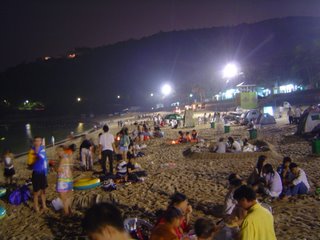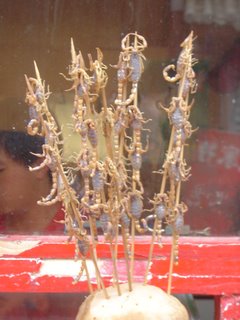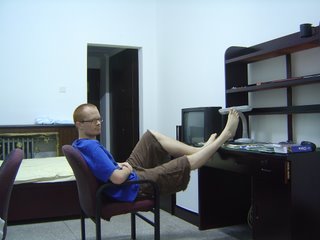For anyone out there who still checks this blog occasionally (that would be you Mazzy), thanks for sticking by...
I did plan, as I promised, that I would post more thoughts, on China or otherwise, when I got home. That was a month ago. I haven't given up on Thusness and I will be posting here, just not necessarily regularly. I also plan to use this as a bit of a photo blog.
But in the meantime, there was something I was going to mention. I don't think I'll capture all of the thought, but I'll have a go at getting at it's essence.
If you were to ask me to sum up what China is like in one word I don't think I could. China is a big country. Big in different ways and on different scales. Geographically, historically, culturally. It is the 4th biggest country and holds the greatest population. It has one of the longest and most diverse histories (and think about all that happened last century!). There are many different cultures: ethnic minorities with more people than most countries; some of the riches and some of the poorest people in the world; some of the most modern and some of the, well, least modern technologies and customs.
But what is one thing that you will see everywhere? What is something that you will see exhibited in many different ways? OK, OK, the heading gave it away... Pushing.
There is no queuing, there is only pushing. How does traffic work? Push your vehicle through (and maybe give way to something bigger than you). In a lot of situations, if you don't learn to push, at least a bit, you won't be able to get anywhere. But I think it is more than just rudeness - it sums up a part of the Chinese way of thinking. If you want to go somewhere, just go. If you want to do something, just do it. And do it now. If you need to talk to someone, call them now. If you need some light in your room, just whack a wire through the window and attach a light globe. If you want to run a
dentist service, why not put it in a shop open to the street (because then you can park your scooter next to the dentist chair). I'm sure there are other better examples, but I hope you get the picture.
In my mind this thought also relates to the concept of freedom. And conditioning. I think we have the preconceived idea that the Chinese people are somewhat brainwashed. Yes, there are restrictions on the press, the internet, certain organisations. So yes, freedom of speech and freedom of the press isn't so great there. This means if the government tells them something it will be harder to question it because there are no, or less, other viewpoints to compare it to. But this idea of pushing... well, there is a freedom there. If you want to do something, you just do it. You can do it in public, loudly, because you don't care what other people think. You don't let
Whereas those in the west, with democracy and free press, and being able to say that your prime minister is not the nicest person on the planet... Well, we're not so free. We're slaves to 'rules' and conventions. We're not free to just do what we want. If the laws don't restrain us, then our consciousness does. We can use driving as an example. Again, I think there are better examples, but it's too late at night to come up with anything better. I saw many things in China that would cause serious accidents in Australia. Little things like overtaking over double lines into oncoming traffic. No problem, the oncoming traffic just veers a bit to the side. Everybody is on the look out for everybody else just driving the way they want. Red lights and road rules are taken as suggestions - if you can push in, then you can go. In Australia if someone did something a little out of the ordinary like that they probably wouldn't react so quickly and something like this would probably end up in a head on collision. That's because Australians are more rigidly confined to certain ways of thinking while driving. We do what 'the government' tells us and blindly expect everyone else to as well. We've been brainwashed by road rules and don't have the freedom to think outside them.
Yeah, I have used a bunch of generalisations, and I haven't explained all my examples as fully as I could. But the point (or, a point anyway) is that there are different kinds of freedoms, some of which China has more than we do and some we have more than them. There freedom is in the (roughly, very roughly) 'just do it' way of thinking.
(I'm not sure how well this thought ended up being expressed. If my little thesis doesn't sound quite right I'm inclined to blame the expression of the thought more than the thought itself. Because it's bed time. And because I haven't reread what I just wrote...)



















































